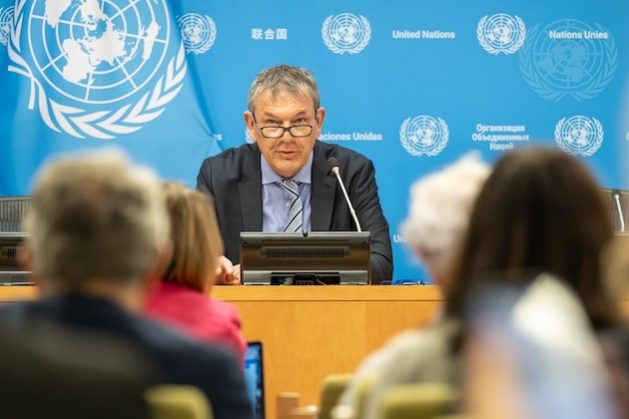Aid, Civil Society, Development & Aid, Featured, Headlines, Humanitarian Emergencies, IPS UN: Inside the Glasshouse, Middle East & North Africa, Peace, Sustainable Development Goals, TerraViva United Nations

Philippe Lazzarini, Commissioner-General of the United Nations Relief and Works Agency for Palestine Refugees in the Near East (UNRWA), briefs reporters at UN Headquarters.
– UNRWA Commissioner-General Philippe Lazzarini asked the UN General Assembly to urge member states to support the organization’s mandate during this period of unprecedented crisis for the region and the agency. He also called for member states to facilitate a “long-overdue political process” for the two-state solution for Israel and Palestine. Only then, in this context, should UNRWA be allowed to transition.
He was speaking at an informal session of the General Assembly on the United Nations Relief and Works Agency for Palestinian Refugees in the Near East (UNRWA). This was convened to discuss the ongoing situation with UNRWA’s capacity as a humanitarian and human development agency in Gaza.
Despite its existence for 75 years, UNRWA’s presence was always intended to be temporary. “It is a stain on our collective conscience that for 75 years, UNRWA has had to fill a vacuum left by the lack of a political solution and genuine peace,” said Lazzarini.
The ongoing hostilities in the Gaza Strip and the resulting destruction of UNRWA facilities, which have disrupted humanitarian services in the region, have led to calls to seek alternatives that can deliver on the scale of the agency or to raise concern about whether other agencies can deliver the necessary humanitarian aid.
“UNRWA is facing a deliberate and concerted campaign to undermine its operations and ultimately end them,” said Lazzarini.
Lazzarini argued that dismantling UNRWA during the current crisis would be shortsighted, given that the agency was designed to provide public services such as education and primary healthcare in a region without state authority. “The notion that the Agency can be dismantled without violating a host of human rights and jeopardizing international peace and security is naïve at best,” he said.
Speaking at a press briefing that same day, Lazzarini told reporters, “We can only feel that the worst is yet to come.” He remarked that since January, aid delivery to Gaza has decreased by 50 percent. Since then, famine has become all but inevitable.
Remarking on the dual investigations into UNRWA’s operations, Lazzarini stated that the investigations were necessary as an accountability measure. These investigations were announced after it was revealed that he had terminated the contracts of 12 staff members who were allegedly involved in the October 7 attacks. Lazzarini added that the “swift decision” to terminate the contracts, as well as the investigations, would likely reflect the agency’s ability to follow through on recommendations from a risk management review.
Lazzarini admitted, however, that he had not anticipated the swift action that 16 donor countries took to suspend their funding in the wake of the allegations, which he revealed were conveyed to him in an oral manner. “I have no regret,” he said, referring to his response to the allegations, “but to be honest, I did not expect that… over the weekend, 16 countries would take that decision.”
The UNRWA chief also indicated that most donor countries would consider resuming their support. For those donor countries, the pressure to pull support came from domestic or public opinion that seems divided over UNRWA rather than foreign policy considerations.
There is some promise that UNRWA will continue to deliver on its mandate with the help of donor states, as was seen with the European Commission’s decision to continue funding the agency, starting with a pledge of 50 million euros. However, this will only go partway into filling the gap of 450 million USD left by the 16 donor countries. Lazzarini warned that without additional funding, the agency would be in “uncharted territory” and would have “serious implications for global peace and security.”
The atrocities that were committed on and since October 7 have only resulted in increasing devastation and tragedy. The international community, as embodied by the General Assembly on Monday, seems largely united in their calls for a humanitarian ceasefire in Gaza and for the safe release of all hostages.
Yet the ongoing hostilities in the region have prevented the UN and its agencies from fulfilling their mandate to safely provide critical emergency aid. Five months on, there is a seeming lack of forward momentum within the Security Council to deliver a ceasefire resolution. UNRWA has been contending with compounding existential questions about its survival as an agency from hostile forces in the Gaza Strip and beyond who call for its dissolution.
IPS UN Bureau Report
